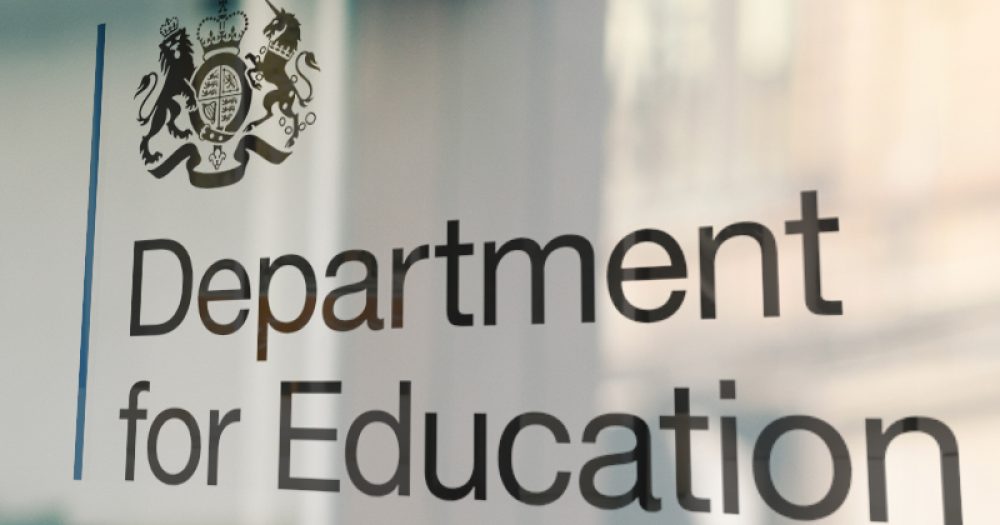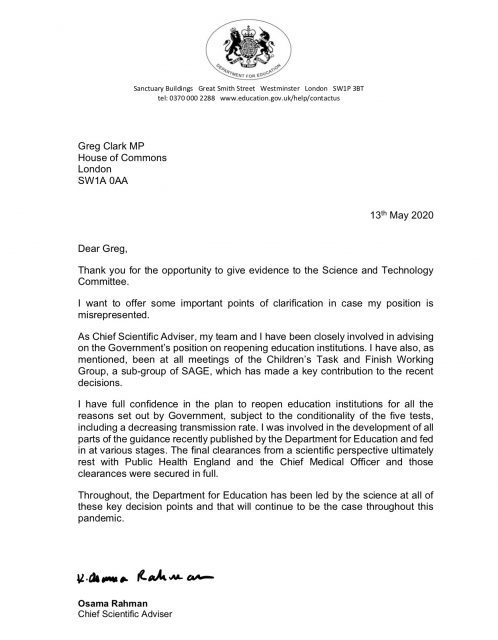The Department for Education’s chief scientific adviser has issued a “clarification” on controversial comments he made about his involvement in school reopening plans.
Speaking at the science and technology committee, earlier today, Osama Rahman said he had not assessed the effectiveness of government guidance published yesterday on how to reopen schools safely.
When later asked about the transmission of the coronavirus and whether the plans were “putting together hundreds of potential vectors that can then go and transmit?”, Rahman said: “Possibly, depending on school sizes.”
He also said the decision to reopen schools was made by cabinet, not the DfE.
But in a letter sent to the committee this evening, published by the department, Rahman said he has “full confidence” in the plans, “subject to the conditionality of the five tests, including a decreasing transmission rate”.
He added he was involved “in all parts of the guidance recently published by the Department for Education and fed in at various stages”.
He said he and his team have been “closely involved in advising on the government’s position on reopening education institutions”, including being at “all meetings of the children’s task and finish working group, a sub-group of SAGE, which has made a key contribution to the recent decision”.
“Throughout, the Department for Education has been led by the science at all of these key decision points and that will continue to be the case throughout this pandemic.”
The letter was published to “offer some important points of clarification in case my position is misrepresented”.
But Vix Lowthion, the Green Party’s spokesperson for education, said the clarification was “strong arm revisionism” that “read like something from a totalitarian state”.
Carol Monaghan, the SNP’s education spokesperson and a former teacher, had told the committee earlier that she “did not think the profession will be satisfied or put at ease with what they are hearing”.









I personally have no idea how anyone would expect children of the ages of 3-4-5 to understand what is happening in relation to the coronavirus. So why then should they be able to understand that they can go into school and nursery but not be able to go near their friends. The social distancing will undoubtedly cause severe distress to all theses children and anxiety for the staff. The virus can be spread at least 3 days before any symptoms occur and I for one know that a child can not always express their condition about being unwell. Therefore any virus present is passed to other children and staff and therefore passed to their families etc etc. The amount of mental suffering that will be caused will probably put the families in the at risk categories so thy are classed as vulnerable too, just escalating to all the worries. I have a hundred more reasons and they will never be read so I will leave it with you
Yesterday, the DfE’s chief scientific adviser said he hadn’t assessed the DfE guidance re school opening, the decision was political and the evidence re transmission by children was mixed. Today, he has full confidence in the government’s guidance and says he fed into ‘parts’ of them. But final clearance of the guidance, which included the parts he didn’t feed into, was in the hands of Public Health England and the Chief Medical Officer.
The letter does not inspire confidence. Instead, it raises the suspicion that the guidance is less to do with ‘the science’ and more to do with ensuring schools fulfill their apparent function: less of education and more of child-minding.
I understand the concern for teachers returning to work however how does the risk of catching covid in the classroom compare to that of bus drivers, supermarket staff. Also is there a higher chance of catching the disease by visiting the supermarket, travelling outside local area or going to the park